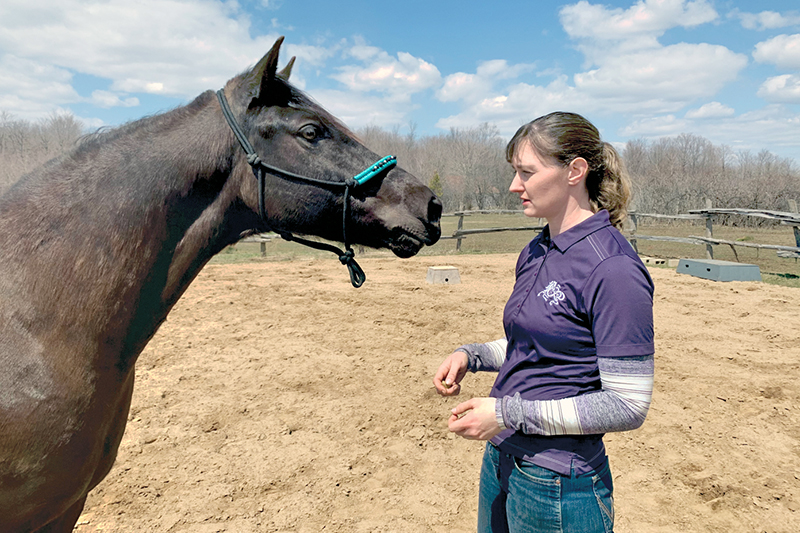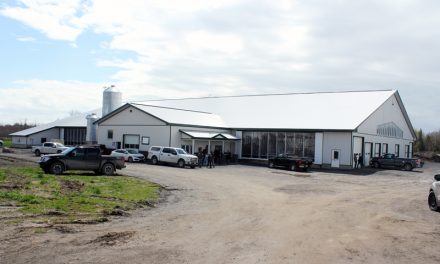Find a reputable lesson barn!
The more time you spend with your horse, the more comfortable you will be. Walker Photo
By Caylyn Walker
AgriNews Contributor
Shopping for a horse can be an exciting yet daunting undertaking. Even for someone well versed in the industry there is a wide range of attributes to take into consideration.
Before anyone goes out looking for their first horse, I always recommend they enrol in a reputable local lesson barn first. This experience will not only teach you some ins and outs of horses in a safe atmosphere, it will also grow your bubble of equine connections, which is quite valuable. While enrolled in your lesson program you should be taught the basics of safety, horse care as well as the riding components to make you a well-rounded horse person. Ensure you ask plenty of questions! Remember, 99 per cent of owning a horse includes doing tasks that do not involve riding, so be sure you take the time to learn all aspects of horsemanship.
While riding different lesson horses, you may discover that you get along better with certain horses over others. Some horses are slow and steady, while others are more sensitive, and some have more “go” than “whoa”. No matter which type of personality you prefer in a horse, it is important that you feel comfortable and confident not only working around the horse, but also when you ride. Horses are naturally intuitive animals and easily pick up on whether a person is nervous or intimidated. Though some horses can be unaffected by a tense rider, other horses can be a very poor match and will become quite reactive or unmanageable for the rider.
The lesson barn will often allow you to ride a variety of horses, but will usually start riders with a ‘steady Eddy’ type of mount, where you will learn the basics of steering, stopping and going forward. During this time you will also learn how to balance on your horse in the different gaits of walk, trot and canter. You will find the more you are around horses the more comfortable you will become and the better you will be able to ride and work around them. Their “random” behaviours become more predictable and you will understand how to work through different problems and find effective solutions.
The benefit of learning these things at a lesson barn is that you will find a support network of not only your coach, but also plenty of barn friends that are more than willing to offer their help and support. Age doesn’t matter when you step into the warmth of a stable; everyone is welcomed into a “barn family”. Not only is it a great learning environment, but the barn will also become a fabulous social circle that you never knew you needed. Also, once you are integrated into one, you will find it hard to imagine your life without these special individuals in your life!
How Do I Find A Reputable Lesson Stable?
One of the most common questions I get asked is how do you know if a lesson barn is reputable? First, if you have friends in the horse world, ask them! The horse world is a small one and just like many niche industries, word travels quickly if someone or somewhere has a good or bad reputation. Never hesitate to do some sleuth work! Search Google for reviews and check on Facebook. You can even ask for recommendations on some of the Facebook groups in your area. Chances are there will be some popular barns that are mentioned many times.
Second, ask lots of questions! If you get a strange vibe or don’t feel comfortable, follow your gut instinct! When you arrive at the barn, check out the horses. Do they look to be well cared for? Are they a good weight? Do they seem content? Are fences in good repair? Are the fields housing a reasonable number of horses?
Third, find out how the lesson program is run. Are they offering Western or English lessons? Does that jive with the type of riding you would like to learn? If you aren’t sure what type of riding you would like to do, a few searches on Google can give you a lot of information. Personally, I recommend that people start riding English first and then switch to Western later if they are inclined to do so, but that decision is up to you!
Find out if the lessons at the barn run as private lessons (one on one with you and the instructor) or group lessons (there will be multiple people riding at once in the arena with you while the instructor teaches). Group lessons usually consist of 5-6 riders at a time. They may also offer semi private lessons (usually a group of 2-3 riders with one instructor). Private lessons are fantastic as you will have the full attention of your riding instructor the entire time and they can tailor the lesson to develop specific skills you may be lacking. You may find, however, that private lessons are cost prohibitive depending on your budget. If you are looking for something a bit more pocketbook friendly, group lessons will cost less, but the attention of the instructor is split amongst the students in the class. This can be useful as you are able to watch other students learn and work through challenges that you may not have encountered yet on horses you have worked with.
The downside to group lessons is the lesson format is not necessarily geared towards skills to develop you specifically as a rider, rather it is created and geared towards the group setting. You may find that more time is spent on certain students if particular students are struggling in the lesson.
Fourth, ask about the instructor or coach who will be teaching you. Are they a certified coach? Equine Canada offers a coach certification program that riding instructors can take to become certified coaches. This program recently went through a major revamp, so it is possible your coach is currently working through the lengthy process and not yet fully certified, but it is a good question to ask! There are also different levels of certification to achieve in coaching. You can find out more about them on the Equine Canada website. You should also ask if your coach is insured to coach. Any professional coach will carry insurance and you can ask to see proof of this certificate. If your coach is not able to provide you with this documentation it is a red flag that they may not be reputable. Ask what type of riding experience or competition experience your coach has. It might seem silly to ask for these credentials when you are new to riding, but remember that this person will be teaching you the fundamental riding skills and that the habits you learn will either help or hinder you in your future riding years. It is always easier to start with a clean slate than it is to fix or re-teach bad habits that have been learned.
Remember that your coach is there to help you learn. If you don’t feel comfortable with your coach or if their teaching style does not mesh well with how you learn, you are best to find a coach that you work well with! There are many different teaching styles — if one style is not working for you, do not be afraid to explore other avenues!
Join us next issue for Part 2 of Preparing yourself for horse ownership!).













